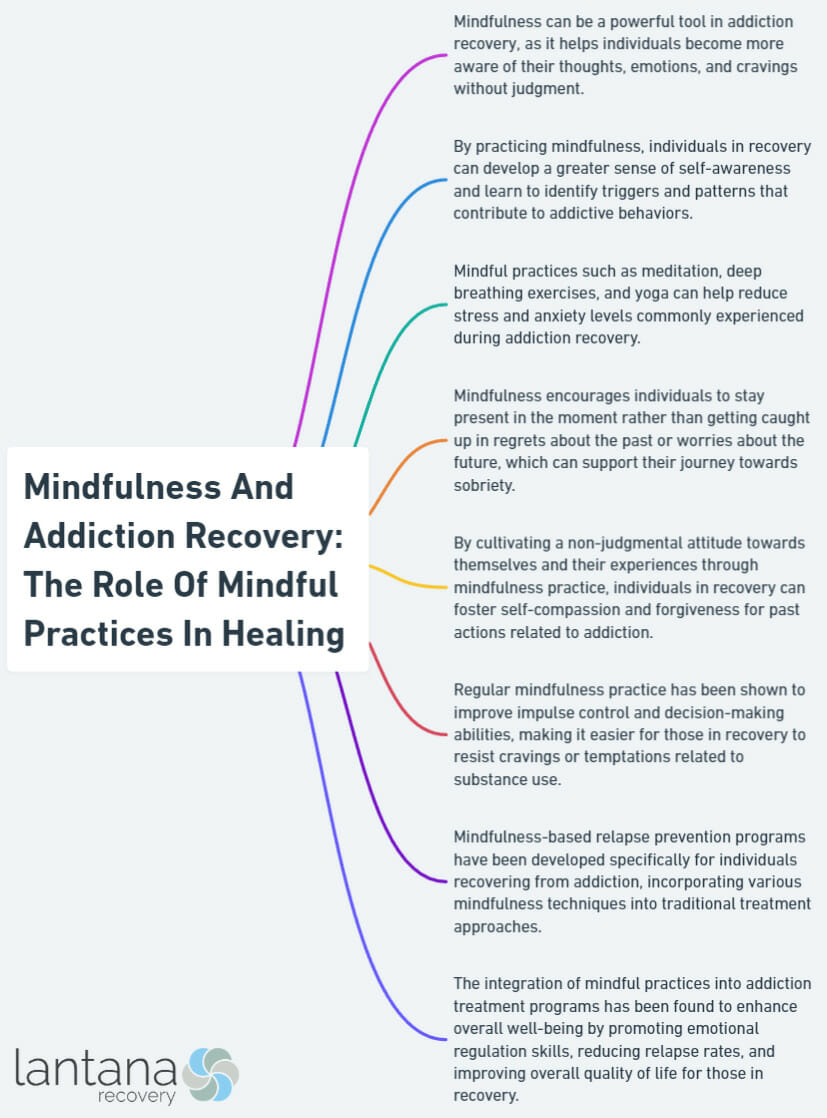Addiction recovery is a complex and challenging journey, requiring a comprehensive approach that addresses both the physical and psychological aspects of addiction. In recent years, mindfulness has emerged as a powerful tool in supporting individuals on their path to recovery. This article will explore the role of mindful practices in healing addiction, the benefits they offer, and how they can be incorporated into addiction treatment programs.
Mindfulness, defined as the practice of intentionally paying attention to the present moment without judgment, has its roots in ancient Buddhist traditions. It has gained significant popularity in the field of psychology and has been extensively studied and integrated into various therapeutic modalities.
Essential to understanding mindfulness are it’s definition and key elements. Mindfulness involves cultivating an open and non-judgmental awareness of one’s thoughts, emotions, bodily sensations, and surroundings. It emphasizes observing these experiences without attachment or aversion and fostering an attitude of acceptance and kindness towards oneself.
The relationship between mindfulness and addiction recovery lies in the ability of mindful practices to bring individuals into the present moment, breaking the cycle of rumination and automatic reactions. By developing this present-moment awareness, individuals can develop a deeper understanding of their cravings, triggers, and patterns of behavior, leading to more conscious choices and responses.
Mindfulness offers several benefits in healing addiction. It helps individuals develop emotional regulation skills, reduce stress and anxiety, improve impulse control, and cultivate self-compassion and self-acceptance. Mindful practices also enhance self-awareness, allowing individuals to observe their thoughts and cravings without becoming identified with them.
Various types of mindful practices can be beneficial in addiction recovery. Meditation, involving focused attention or open monitoring of thoughts and sensations, helps individuals develop concentration, calmness, and insight. Yoga combines physical postures, breathwork, and mindfulness, promoting physical and mental well-being. Breathing techniques and body scan exercises can also help individuals ground themselves in the present moment and develop body awareness.
Mindfulness-based interventions are integrated into therapy sessions, helping individuals develop skills to manage cravings, navigate difficult emotions, and prevent relapse. Residential addiction treatment programs often incorporate mindfulness practices such as meditation and yoga as part of their holistic approach to recovery.
While cultivating mindful practices in daily life can be empowering, it is important to address the challenges and considerations in mindfulness-based addiction recovery. Resistance to mindfulness, as well as the risk of relapse, may arise for some individuals. Therefore, professional guidance, ongoing support, and a comprehensive treatment plan that includes mindfulness as one component are essential for long-term success.

The Importance of Addiction Recovery
Addiction recovery holds significant importance for individuals struggling with substance abuse. “Understanding the role of affective, cognitive, and cognative mediators in the relationship between mindfulness and craving is vital for developing more effective mindfulness-oriented treatment approaches for individuals with substance use disorders” (Cognitive and Affective Mechanisms Linking Trait Mindfulness to Craving Among Individuals in Addiction Recovery, Garland et al., 2014.) There are several compelling reasons why addiction recovery should be prioritized:
1. Health improvement: Substance abuse takes a toll on both physical and mental well-being. Embracing addiction recovery greatly contributes to overall health enhancement, enabling individuals to lead more fulfilling and productive lives.
2. Rebuilding relationships: Addiction often damages relationships with loved ones. However, through the process of recovery, individuals have the opportunity to mend broken bonds, rebuild trust, and establish positive connections with family and friends.
3. Personal growth: Addiction recovery fosters personal development and self-discovery. It equips individuals with the necessary tools and support to address underlying issues and develop healthier coping mechanisms.
4. Professional success: Substance abuse detrimentally impacts work performance and future career prospects. On the other hand, embracing recovery enhances focus, productivity, and reliability, significantly increasing the chances of achieving professional success.
Pro-tip: It is crucial to surround yourself with a strong support network consisting of loved ones and individuals who comprehend the challenges of addiction recovery. This support system can provide encouragement, guidance, and accountability, making your journey toward sobriety more successful. Always remember, you are never alone in this. Seek help and embrace the positive changes that addiction recovery can bring to your life.
What is Mindfulness?
Mindfulness is a powerful tool that can play a pivotal role in addiction recovery. So, what exactly is mindfulness? In this section, we will dive into the essence of mindfulness and uncover its key elements.
Definition of Mindfulness
Mindfulness is the practice of being present without judgment or attachment to thoughts, feelings, sensations, and surroundings.
Key Elements of Mindfulness:
- Attention: Actively directing one’s attention to the present moment.
- Non-judgment: Accepting thoughts, feelings, and experiences without labeling them.
- Awareness: Cultivating curiosity and openness towards internal and external experiences.
- Acceptance: Acknowledging and accepting things as they are.
Mindfulness is crucial in addiction recovery, allowing individuals to become more aware of cravings, triggers, and negative emotions. This awareness helps individuals choose healthier responses instead of falling into old patterns of addiction.
Benefits of Mindful Practices in Healing Addiction:
- Increased self-awareness
- Improved impulse control
- Enhanced emotional regulation
- Reduced stress and anxiety
- Greater ability to cope with cravings
Incorporating mindfulness into addiction treatment programs can be highly beneficial. It can be integrated into therapy sessions and residential programs, offering dedicated mindfulness activities like meditation, yoga, breathing techniques, and body scans.
John’s story exemplifies the power of mindfulness in addiction recovery. Through a mindfulness-based treatment program, he observed his cravings without reacting and gradually reduced his alcohol consumption. With continued practice, John developed healthier coping mechanisms and achieved long-term sobriety.
Key Elements of Mindfulness
The key elements of mindfulness, including focus, awareness, and non-judgmental acceptance, are crucial for incorporating mindfulness into daily life. By directing attention to the present moment, individuals can develop clarity and gain a deeper understanding of their experiences. Mindfulness also helps cultivate a heightened sense of awareness, allowing individuals to be fully present and attuned to their surroundings, emotions, and bodily sensations. Through increased awareness, individuals can better understand both their internal and external experiences. Another important element of mindfulness is non-judgmental acceptance, which involves observing thoughts, feelings, and sensations without judgment or attachment. This practice cultivates compassion and acceptance towards oneself and others, making it especially valuable in addiction recovery.
To incorporate these key elements into daily life, it is recommended to start with short mindfulness meditation sessions. Dedicate a few minutes each day to focusing on your breath, observing thoughts and emotions without judgment, and cultivating present-moment awareness. Additionally, practice mindfulness in everyday activities such as eating, walking, or having conversations by paying attention to sensory experiences and being fully present in the moment. Regular practice of mindfulness enhances overall well-being and provides support on the journey toward addiction recovery.
Benefits of Mindful Practices in Healing Addiction
According to a research paper titled Mindfulness-based treatment of addiction by Garland & Howard in 2018, over the last decade, researchers have extensively examined mindfulness-based interventions (MBIs) as potential treatments for various addictive behaviors. These interventions have been investigated in relation to drinking, smoking, opioid misuse, and the use of illicit substances such as cocaine and heroin.
Mindful practices offer several benefits in healing addiction. These practices promote self-awareness and understanding of thoughts, emotions, and behaviors. By incorporating mindfulness into addiction treatment programs, individuals can experience the following benefits:
-
Reduce cravings: Through mindfulness, individuals can observe cravings without succumbing to them. By being aware of addiction triggers and patterns, individuals can effectively manage and eventually reduce their cravings.
-
Reduce stress: Mindful practices, such as meditation and deep breathing techniques, are highly effective in reducing stress levels. Mindfulness allows individuals to focus on the present moment, finding inner peace even amidst challenges.
-
Improve emotional regulation: Mindfulness helps individuals develop emotional intelligence, enabling them to understand and cope with emotions without judgment. This enhanced emotional regulation helps prevent relapse.
-
Cultivate self-compassion: Mindfulness fosters a non-judgmental attitude towards oneself, reducing feelings of guilt, shame, and self-blame. This nurturing environment promotes healing and self-acceptance in addiction recovery.
-
Enhance self-control: By incorporating mindfulness practices, individuals can improve their impulse control and decision-making abilities. Taking a pause before reacting impulsively allows individuals to make healthier choices aligned with their recovery goals.
To fully reap the benefits of mindful practices in addiction healing, it is essential to seek guidance and support from trained professionals. Integrating mindfulness into therapy sessions and residential treatment programs can greatly enhance their overall effectiveness.

Types of Mindful Practices for Addiction Recovery
Discover the power of mindful practices in addiction recovery as we explore the different types of techniques that can aid in the healing process. From meditation to yoga, breathing techniques to body scans, these practices offer a holistic approach to tackling addiction head-on. With each sub-section delving into a specific technique, you’ll gain insights into their unique benefits and understand how they contribute to the journey of recovery. Get ready to unlock the transformative potential of these mindful practices in your path to healing.
Meditation
Meditation greatly benefits individuals in addiction recovery. It cultivates mindfulness, enhances self-awareness, and develops coping mechanisms for cravings and triggers.
During meditation, find a quiet and comfortable space to sit or lie down. Focus on the breath or a specific object to bring attention to the present moment and let go of distracting thoughts or emotions. This practice promotes calm and inner peace.
Research shows that regular meditation has a positive impact on addiction recovery. It reduces stress, improves emotional regulation, and promotes well-being. A study by the National Institutes of Health found that those who meditated had a higher abstinence rate.
Incorporating meditation into addiction treatment programs is beneficial. It can deepen self-awareness and explore underlying issues contributing to addiction. Residential treatment programs can offer structured meditation sessions.
To cultivate a regular meditation practice, start with short sessions and gradually increase the duration. Be consistent and make meditation a part of your daily routine. Find a meditation style that resonates, such as guided or mindfulness meditation.
Suggestions:
- Start with 5-minute daily meditation sessions and increase duration gradually.
- Attend group meditation sessions or find resources like free addiction recovery books or online guided meditations.
- Explore different meditation techniques to find the most resonant one.
- Be patient and gentle with the meditation practice as progress takes time.
- Seek professional guidance and support when incorporating meditation into addiction recovery.
Yoga
Yoga supports addiction recovery. Here’s why:
1. Physical benefits: Yoga improves strength, flexibility, and balance. It also relieves muscle tension and promotes relaxation.
2. Mental and emotional well-being: Yoga reduces stress, anxiety, and depression. It promotes calmness and clarity of mind.
3. Spiritual connection: Yoga provides a sense of purpose and connection to something greater.
4. Self-care and self-discipline: Yoga encourages prioritizing physical and mental health. It cultivates self-discipline and self-awareness.
5. Community support: Practicing yoga in a group allows connection with others on the recovery path. It provides a supportive and non-judgmental community.
Fact: A study by Sakar & Varshney in 2017, Yoga and substance use disorders, found that yogic breathing exercises have the potential to lower heart rate and blood pressure, making them potentially beneficial for individuals undergoing substance detoxification.
Breathing Techniques
Breathing Techniques are crucial in addiction recovery. They help manage stress, cravings, and emotional turbulence. Here are some breathing techniques to support healing:
1. Deep Breathing: Take slow, deep breaths to activate the relaxation response. Inhale through your nose, allowing your abdomen to expand, and exhale through your mouth, releasing tension.
2. Box Breathing: Inhale, hold, exhale, and hold again for an equal count. For example, inhale to a count of four, hold for four, exhale for four, and hold for four. Repeat to promote focus and balance.
3. Diaphragmatic Breathing: Breathe deeply from the diaphragm to lower heart rate, reduce stress, and increase oxygen flow. Place one hand on your abdomen, and inhale through your nose, allowing your abdomen to rise. Exhale slowly through your mouth, contracting your abdomen.
4. 4-7-8 Breathing: Combine deep breathing and counting to promote relaxation. Inhale through your nose to a count of four, hold for seven, and exhale through your mouth to a count of eight. Repeat this cycle several times.
5. Alternate Nostril Breathing: Balance energy flow and promote mental clarity. Close your right nostril with your right thumb, and inhale through your left nostril. Close your left nostril with your right ring finger, release your thumb, and exhale through your right nostril. Repeat, alternating nostrils.
Incorporate these breathing techniques into your mindfulness practice to enhance relaxation, reduce stress, and cultivate well-being and emotional stability during addiction recovery.
Body Scan
When it comes to addiction recovery, body scans can play a crucial role. A body scan is a mindfulness technique that involves focusing on different body parts to promote relaxation and self-awareness.
During a body scan, you can lay down or sit comfortably and slowly direct your attention to each body part, starting from the head and moving down to the toes. For each body part, observe any physical sensations, tension, or discomfort without judgment.
Benefits of a Body Scan in Addiction Recovery:
1. Promotes relaxation and reduces stress levels.
2. Increases body awareness and identifies areas of tension or discomfort.
3. Enhances mindfulness and staying present at the moment.
4. Cultivates acceptance and non-judgment towards physical sensations.
5. Helps individuals connect with emotions and sensations, useful in identifying triggers for addictive behaviors.
Regular practice of body scans is important to reap the benefits. Incorporating them into addiction treatment programs, like therapy sessions or residential programs, provides guidance and support for consistent practice. Professional guidance is valuable in addressing resistance or relapses.
To cultivate mindful practices like body scans in daily life, set aside dedicated time and create a quiet and comfortable environment. Consistency and finding a practice that resonates with you are crucial for long-term success.
By incorporating body scans into addiction recovery, individuals can develop a deeper understanding of their bodies and emotions, promoting overall well-being and aiding in the healing process.

Incorporating Mindfulness into Addiction Treatment Programs
Discover the power of incorporating mindfulness into addiction treatment programs. Uncover how integrating mindful practices into therapy sessions and residential addiction treatment programs can enhance the recovery journey. With a focus on mindfulness, these programs offer a holistic approach to healing, helping individuals cultivate self-awareness, regulate emotions, and develop healthier coping mechanisms. Learn how mindfulness can become a transformative tool in the path toward addiction recovery.
Integration of Mindfulness in Therapy Sessions
Integrating mindfulness in therapy sessions benefits individuals in addiction recovery by helping them develop a deeper awareness of their thoughts, emotions, and cravings, aiding in their healing process. Here are some ways to incorporate mindfulness into therapy sessions:
- Guide patients through mindfulness meditation practices to help them focus on the present moment and observe their thoughts and emotions without judgment.
- Teach deep, intentional breathing techniques to assist individuals in grounding themselves and managing stress and anxiety during therapy sessions and in their daily lives.
- Lead individuals through a body scan exercise, where they can focus on each part of their body and bring attention to any sensations or tension. This promotes relaxation and body awareness.
- Include mindful movements like gentle yoga or tai chi to facilitate a connection between the body and mind, improve self-regulation, and reduce cravings and stress during therapy sessions.
True story: Sarah, a recovering addict, attended therapy sessions that integrated mindfulness practices. Through guided meditations and breathing exercises, she learned to observe her cravings without acting on them. Sarah developed self-awareness and identified triggers for her addictive behaviors. Mindfulness in therapy empowered Sarah to respond to cravings with greater resilience as she managed her emotions and stress without resorting to substances. Over time, mindfulness integration became an essential tool in her recovery journey.
Residential Addiction Treatment Programs
Residential addiction treatment programs are designed to provide a structured and supportive environment for individuals seeking recovery from addiction. These programs offer comprehensive care and support to address addiction and work towards a healthier life.
One key aspect of residential programs is inpatient care, which involves staying at a treatment facility and receiving round-the-clock care and support. This allows for intensive treatment and constant supervision, ensuring access to necessary medical support and therapy.
Therapeutic approaches are also a crucial part of residential programs and have been made possible with the Comprehensive Addiction and Recovery Act 2016. These programs offer tailored therapeutic approaches, such as individual counseling, group therapy, family therapy, and specialized therapies like cognitive-behavioral therapy (CBT) or dialectical behavior therapy (DBT). These various therapies address the root causes of addiction and help individuals develop coping mechanisms for long-term recovery.
Furthermore, residential programs provide peer support, connecting individuals with others who are on a similar recovery journey. This fosters a sense of community and reduces feelings of isolation, creating a supportive network for individuals in need.
Another important aspect of residential treatment programs is the structured environment they provide. These programs establish a daily schedule and routine, assisting individuals in developing healthy habits and promoting stability and resilience in their recovery process.
Additionally, residential programs focus on aftercare planning to ensure individuals have continued support once they leave the program. This may include outpatient treatment, support groups, or ongoing therapy to maintain long-term sobriety.
Overall, residential addiction treatment programs are designed to support individuals in their recovery journey, greatly enhancing their chances of successful recovery. Seeking professional help from Lantana Recovery and considering residential treatment can be a critical step toward achieving long-lasting sobriety and improved overall well-being.

Tips for Cultivating Mindful Practices in Daily Life
Here are some tips for cultivating mindful practices in daily life:
1. Start your day with intention: Set aside a few minutes in the morning to center yourself and set positive intentions for the day.
2. Incorporate mindfulness into everyday activities: Practice being fully present in daily tasks like brushing your teeth, eating meals, or taking a walk.
3. Use breathing exercises: Take a few moments throughout the day to focus on your breath. Deep breathing can calm the mind and reduce stress.
4. Create a mindfulness routine: Dedicate time each day to formal mindfulness practices, such as meditation or yoga.
5. Practice gratitude: Reflect on and appreciate the small joys and blessings in your life each day.
6. Be mindful of thoughts and emotions: Notice negative or unhelpful thought patterns and consciously shift your focus to positive and productive thoughts.
7. Connect with nature: Spend time outdoors and immerse yourself in the beauty and serenity of nature.
A few years ago, I began incorporating mindful practices into my daily life. I started each morning with a short meditation, setting positive intentions for the day. Throughout the day, I made a conscious effort to be fully present in my activities, whether eating, walking, or working. Breathing exercises helped me stay grounded during moments of stress. I also established a routine of practicing mindfulness through yoga and meditation in the evenings. Cultivating mindfulness significantly improved my well-being and ability to manage stress. It transformed my perspective, allowing me to appreciate simple joys and find gratitude in everyday moments. Connecting with nature became a regular part of my routine, providing solace in the beauty and tranquility of the outdoors. Mindful practices have truly enhanced my daily life and brought a sense of peace and fulfillment.

Challenges and Considerations in Mindfulness-based Addiction Recovery
When it comes to using mindfulness-based practices for addiction recovery, we must address the challenges and considerations that arise along the way. In this section, we’ll explore two crucial aspects: dealing with resistance and relapse while staying on the path to recovery, and the vital role of professional guidance and support in this journey. So, let’s jump in and uncover the strategies and support systems that can aid individuals in their transformative process of healing from addiction.
Addressing Resistance and Relapse
Resistance and relapse are common challenges in the recovery process. To address resistance, a supportive and non-judgmental environment is essential. For instance, LaBelle et al., explains in The Role of mindfulness, meditation, and peer support in recovery capital among Recovery Dharma members that Recovery Dharma (RD) is a peer support program for addiction treatment rooted in Buddhist principles. This program integrates mindfulness and meditation into its meetings, program literature, and the overall recovery process. Creating a safe space where individuals feel heard and understood helps them explore resistance and underlying reasons.
Education about addiction and treatment also helps individuals overcome resistance. For relapse prevention, a proactive approach is essential. Developing coping skills and strategies involves identifying triggers and healthy ways to cope. Establishing a strong support system of therapists, support groups, and loved ones who understand the challenges of addiction recovery is important.
Professional guidance and support are vital in addressing resistance and preventing relapse. Therapists and counselors offer valuable insights and strategies to overcome patterns of resistance and relapse.
Importance of Professional Guidance and Support
The importance of professional guidance and support in addiction recovery significantly enhances the chances of successful outcomes. Professionals offer the expertise and specialized knowledge necessary for understanding addiction complexities and providing appropriate interventions. Addiction counselors and therapists assess individual needs and develop tailored treatment plans, equipping individuals with coping strategies and tools to navigate recovery challenges. Professionals create a safe and supportive environment for exploring underlying issues contributing to addiction and help prevent relapse by identifying triggers and providing resilience-building strategies. Ongoing monitoring and guidance ensure individuals stay on track and maintain sobriety. Professional guidance and support provide accountability and motivation, contributing to the success and sustainability of the recovery journey. Seeking professional help from Lantana Recovery, a Greenville Rehab Center is a proactive step towards long-term sobriety.

Frequently Asked Questions
How can mindfulness practices benefit individuals recovering from addiction?
Mindfulness practices can benefit individuals recovering from addiction by helping them stay present in the moment and develop self-awareness. They can also assist in managing cravings, reducing stress and anxiety, improving emotional regulation, and promoting overall mental and physical well-being. Mindfulness can reshape the brain and provide individuals with lifelong skills for maintaining sobriety.
Can mindfulness be helpful for individuals with co-occurring disorders?
Yes, mindfulness can be helpful for individuals with co-occurring disorders. By practicing mindfulness, individuals can become more aware of how their thoughts and feelings affect them and can develop healthier coping mechanisms. Mindfulness can also reduce negative self-talk and combat the critical mindset often associated with addiction and mental illness.
What are some common mindfulness exercises that can be practiced during addiction recovery?
Some common mindfulness exercises that can be practiced during addiction recovery include focusing on the breath, body scans, mindful walking, meditation, yoga, and engaging in activities that promote stillness, such as journaling or making art. These exercises can help individuals find and maintain inner peace, reduce stress and anxiety, and cultivate self-awareness.
How does mindfulness help individuals resist sudden urges and avoid relapse?
By practicing mindfulness, individuals can develop better impulse control and become more aware of their thoughts and emotions. This awareness allows them to resist sudden urges and make conscious choices in response to triggers and cravings. Mindfulness also helps individuals accept and tolerate discomfort without relying on drugs or alcohol, reducing the likelihood of relapse.
Are peer support groups and counseling commonly used in mindfulness-based addiction recovery programs?
Yes, peer support groups and counseling are commonly used in mindfulness-based addiction recovery programs. Peer support groups provide individuals with a sense of community and understanding, while counseling, such as cognitive-behavioral therapy (CBT), can help individuals identify and reframe negative thoughts and behaviors. These support systems can enhance the effectiveness of mindfulness practices in addiction recovery.
How can mindfulness techniques be incorporated into daily life for individuals in addiction recovery?
Mindfulness techniques can be incorporated into daily life by practicing conscious breathing, staying present in the moment, letting thoughts become background noise, and not expecting perfection. Engaging in activities that promote mindfulness, such as yoga or meditation, and making small changes towards intentional living can also help individuals maintain mindfulness throughout their recovery journey.









